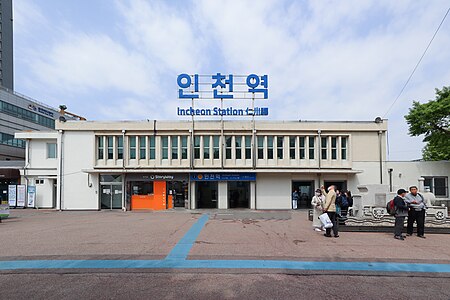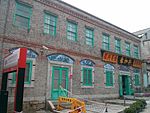Incheon Station

Incheon Station (Korean: 인천역; Hanja: 仁川驛; RR: Incheon-nyeok) is the western terminus railway station of the Suin–Bundang and Gyeongin lines of the Seoul Metropolitan Subway. The station is in the Bukseong neighborhood of the Jung District in Incheon, South Korea and is approximately 20 kilometers west of Seoul.: 115 Established in 1899 under the Korean Empire as Chemulpo Station (제물포역; 濟物浦驛), Incheon Station is the oldest train station in the Seoul Capital Area. During the Japanese occupation of Korea, the station was briefly named Hainchon Station (하인천역; 下仁川驛) and the original station building was destroyed during the Korean War. Service for the old Suin Line began in 1937 and ended in 1995; the new Suin Line (later merged as the Suin–Bundang Line) was extended to the station in 2016. Service for the Gyeongin Line began in 1974.
Excerpt from the Wikipedia article Incheon Station (License: CC BY-SA 3.0, Authors, Images).Incheon Station
Injung-ro, Incheon Bukseong-dong
Geographical coordinates (GPS) Address Nearby Places Show on map
Geographical coordinates (GPS)
| Latitude | Longitude |
|---|---|
| N 37.475833333333 ° | E 126.61694444444 ° |
Address
1
Injung-ro
22312 Incheon, Bukseong-dong
South Korea
Open on Google Maps










